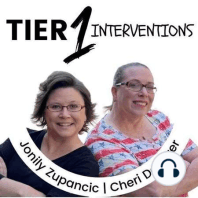4 min listen

How to stimulate intentional thinking in the 21-century classroom: T1I E3
How to stimulate intentional thinking in the 21-century classroom: T1I E3
ratings:
Length:
23 minutes
Released:
Mar 5, 2024
Format:
Podcast episode
Description
Welcome to our latest episode of the "Tier One Interventions" podcast, where we delve into the critical role of foundational classroom strategies in maximizing learning for all students. This episode, hosted by Jonily Zupancic and Cheri Dotterer, explores the nuances of cognitive demand and load and how understanding these concepts can revolutionize classroom engagement and effectiveness.The Core of Tier One Interventions:Tier One interventions are the bedrock of a robust educational framework, focusing on the general classroom environment where all students, regardless of their abilities or disabilities, receive instruction. The strength of Tier One is crucial as it sets the foundation for higher-tier interventions and ensures that every student's needs are met within an inclusive setting. Teachers can create a conducive learning atmosphere that fosters deep understanding and retention by employing instructional strategies that cater to the student's body, brain, and emotions.Cognitive Load vs. Cognitive Demand:A pivotal distinction discussed in this episode is between cognitive load and cognitive demand. Cognitive load refers to the overwhelming influx of information that can lead to disconnection and frustration, often manifesting in negative student behaviors. In contrast, cognitive demand represents the "sweet spot" of learning, where students are engaged, focused, and motivated. Achieving this balance requires skillful facilitation incorporating visual, multisensory, and conceptual approaches, ensuring the content is accessible and stimulating for all learners.The Flow Cycle:Cheri Dotterer introduces the concept of the flow cycle, a four-step process that includes struggle, release, flow, and recovery. This cycle is essential for productive learning, as it allows for integrating new information with existing knowledge, leading to deeper comprehension and creativity. Authentic learning and engagement occur in the flow state, where cognitive demand is optimized. Teachers can facilitate this state by providing physical exercise, hydration, and social interaction opportunities, all of which contribute to the brain's readiness to absorb and process new information.Practical Strategies for Teachers:The episode offers practical strategies for teachers to implement to promote productive struggle and cognitive demand in their classrooms. Questions like "What do you see?" "What do you notice?" and prompts like "Tell me about..." encourage students to share their perspectives, differentiating instruction naturally. These techniques engage students and signal that their thoughts and contributions are valued, fostering a sense of belonging and motivation.The Importance of Research-Based Strategies:Jonily Zupancic emphasizes the importance of grounding instructional strategies in research. The podcast references influential works and experts in the field, such as "Make It Stick" and Steven Kotler, to underscore the scientific basis of their teaching approaches. These strategies are supported by cognitive science and proven to enhance learning outcomes by creating an environment where students can thrive intellectually and emotionally.In conclusion, this "Tier One Interventions" episode sheds light on the transformative power of understanding and implementing effective instructional strategies. Educators can create a dynamic and inclusive learning environment where students can achieve their full potential by focusing on cognitive demand, embracing the flow cycle, and employing research-based techniques.
Released:
Mar 5, 2024
Format:
Podcast episode
Titles in the series (7)
Tier 1 Interventions Podcast Trailer by Tier 1 Interventions